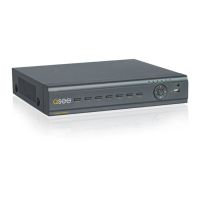APPENDIX B: RECORDING CAPACITY QT426 User Manual
94 | Page
APPENDIX B: CALCULATE RECORDING CAPACITY
Users can calculate the hard drive size needed according to the time saving specification and DVR recording settings
listed below. Below is an estimated table outlining hard drive space used when the DVR is configured at various
settings.
VIDEO
RESOLUTION FRAME RATE (FPS)
VIDEO
BIT RATE
SPACE USED
30 Highest 1M 465
Higher 768k 297
Low 384k 173
Lower 256k 115
Lowest 128k 56
PAL CIF
25 Highest 1M 466
Medium 512k 235
Lower 256k 56.4
Lowest 128k 45
The calculation format is:
Total Recording capacity =Used space per hour (MB/h) (coverage rate of hard drive) × recording time
(hour) ×channel numbers
For instance, one customer uses NTSC cameras, set resolution to CIF, video quality to Lowest, frame rate to 30
fps for enabling total 8 channels. He wants the unit to record continuously for a month. Below is the calculation:
Total Recoding capacity =56 (mb/h) X 24(hours/day) X30(days) X8(channels)
= 322560(MB)≈315(GB)
Therefore, customers who install only one SATA HD with 320GB can expect to achieve almost one month of
recording time.

